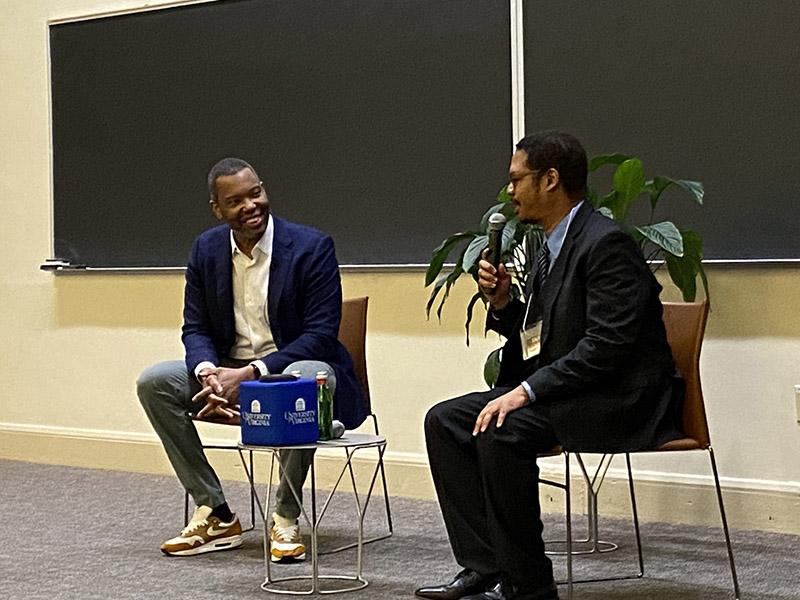Ta-Nehisi Coates Speaks at UVA on the Future of Reparations and the Power of Writing

Author, journalist and activist Ta-Nehisi Coates, spoke on Friday, March 8, to a UVA audience and to attendees of the ninth annual conference of the African American Intellectual History Society hosted by the University’s Carter G. Woodson Institute for African-American and African Studies. The theme of the independent scholarly organization’s meeting was “Reparations: Past, Present, and Future,” and during the keynote event held in the John W. Warner Hall auditorium, Coates spoke with AAIHS president Robert Greene and audience members about his 2014 article “The Case for Reparations.”
Coates’ article, the cover story for the June 2014 issue of The Atlantic, focused on housing discrimination and redlining, the practice of withholding financial services from neighborhoods with significant numbers of racial and ethnic minorities, won critical acclaim for inspiring meaningful debate among politicians, activists and policy makers over the subject of reparations, and it gained Coates a place in the national spotlight.
In his article, Coates proposed moving away from the idea of reparations as “a handout, a payoff, hush money, or a reluctant bribe” and instead focused on it as an opportunity to effect “A revolution of the American consciousness [and] a reconciling of our self-image as the great democratizer with the facts of our history.”
Speaking on a college campus that was the site of a white-supremacist “Unite the Right” rally in 2017, Coates said, “These debates have taken on added urgency in the last few years.”
Reflecting on his career prior to “The Case for Reparations,” Coates said that much of his career to that point had represented an effort to assemble the tools he needed to write the essay about the disadvantages Black communities were facing across the country.
“I had reached a point where I felt like all of the tools I was searching for I had,” Coates said, “I felt like I had an answer, and my job as a writer was to render that answer – that all Black people know in their bones and in their hearts – with the kind of science, with the kind of force, and I would argue, even with the kind of poetry that people who didn’t necessarily know it would feel it echo in their hearts.”
Looking forward, Coates said he is optimistic about the future of the debate over reparations, but he admitted that the direction it might take is less clear to him.
While he said he was not opposed to programs like Affirmative Action or less tangible diversity initiatives, Coates said he felt they lacked the clarity of a solution that compensates the Black community for what was taken from it.
“The idea of reparations is not as laughable as it once was,” Coates said. “But that doesn’t mean that the fight is over. There are still conversations and fights to have, but that’s the nature of our struggle.”
Having recently returned from a trip to the Middle East where he had a chance to observe the living conditions in Palestine, Coates also commented on the implications the subject of reparations has outside of the United States. He drew parallels to the Israeli and Palestinian conflict and the social and economic disparities that existed long before the war began.
“When I went to the West Bank I knew that the Black struggle and Black writing has global significance,” Coates said, especially for others facing oppression and its consequences. “Doing whatever it takes to remove the layers of oppression for Black people is only part of it.”
Coates also talked briefly about his next book, his first in five years. The book is about writing, Coates said: the politics of writing and the challenges of achieving clarity and immediacy in writing in a way that leads to action.
“You can’t act on what you can’t see,” Coates said. “That’s the basis of good writing.”
Conference sessions earlier that day and into Saturday featured leading scholars activists, educators and artists addressing the issue of reparations on a global scale through interdisciplinary scholarship and public engagement. A film screening of The Big Payback on Friday offered attendees an opportunity to interact with filmmaker Robin Sue Simmons, an Illinois alderman and activist whose work led to the first government-funded reparations program for Black Americans in American history.
AAIHS president Robert Greene said, “Simmons work symbolizes the radical potential of the reparations debate on the local level. Her organization, FirstRepair, continues to press the reparations debate across the United States.”
A preliminary event on Thursday evening offered attendees an introduction to “Swords into Ploughshares: The Future of the Robert E. Lee Statue,” the Charlottesville project aimed at repurposing a Confederate Civil War Monument, and the meeting concluded with a musical performance by percussionist, sound artist and composer JoVia Armstrong.
After the event, Woodson director and Commonwealth Professor of African American & African Studies, Robert Trent Vinson, said “The Woodson was so proud to host this past weekend's outstanding conference. In particular, Ta-Nehisi Coates' stirring keynote address reminded us again why he is a leading public intellectual in American life.”







